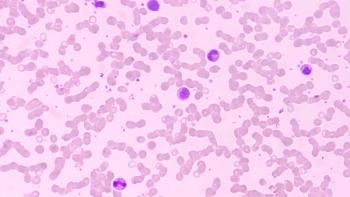
Examining Racial Genomics in Prostate Cancer
Although the genomic profiles of African American men with prostate cancer differ from those of European American men, new data show that the frequency of actionable mutations for which targeted therapies exist occurs at a comparable rate in both populations.
Although the genomic profiles of African American men with prostate cancer differ from those of European American men, new data show that the frequency of actionable mutations for which targeted therapies exist occurs at a comparable rate in both populations. This indicates that African American men can still benefit from available treatments presuming therapy is equitable.1
The ongoing National Cancer Institute—sponsored RESPOND study is the largest research effort seeking to identify determinants of the disproportionate incidence of prostate cancer and mortality rate among African American men.2 Findings from the study have identified novel variations in the African American population and underscored genomic alterations in known therapeutic targets that present at similar frequencies in the racial groups,1 according to Franklin W. Huang, MD, PhD, a corresponding author of the RESPOND study and an assistant professor in the Department of Medicine at the University of California, San Francisco.
“African American men are often underrepresented in clinical trials and genomics research, so 1 key takeaway is that in this study, we found that African American men have similar frequencies of genomic alterations in genes and pathways that are being targeted by currently approved drugs, so they could benefit from these therapies if we ensure access to them,” Huang told OncLive, a sister publication of Oncology Nursing News.
Evidence of Genomic Diversity
To facilitate their analysis, the investigators evaluated genomic data from 4 data sets: the Multi-Center Mutation Calling in Multiple Cancers call set from the Pan-Cancer Atlas project of The Cancer Genome Atlas network; 2 from the African ancestry prostate cancer cohort, which contained both whole exome and targeted sequencing data; and the Memorial Sloan Kettering Cancer Center’s MSK-IMPACT panel. Twenty-nine percent (n = 250) of patients were African American, and 71% (n = 611) were European American.1
Across all 4 data sets, 15 genes were mutated in 2 or more patients. Somatic mutations in ZFHX3 were found at a significantly increased rate in African American patients compared with European American patients (6.0% vs 2.1%; P = 7E—5; false discovery rate [FDR] = 0.001). TP53 mutations were observed in 40 African American patients and 39 European patients (P = .02; FDR = 0.13), signifying that race was not a correlating factor for TP53. Truncating mutations, however, were more common in African Americans (FDR < 0.05). Mutations in FOXA1 and SPOP were associated with age rather than race (FDR < 0.05).1
Novel focal deletion peaks were observed in African American patients on chromosome 1q23.1 centered on ETV3, which was not detected in European American men. Deep ETV3 deletion frequency was significantly higher in African American men (6.3% vs 2.3%; P = .021).
Tumors with deletions in ZFHX3 were significantly enriched in African American patients (8.8%) versus European American patients (3.2%), as were deletions in NKX3-1, which occurred in 11.1% and 5.9% of patients, respectively (FDR < 0.05). Alternatively, PTEN deletions presented more commonly in European Americans versus African Americans (15.3% vs 5.9%, respectively) with an FDR of less than 0.05. Finally, MYC amplifications were associated with higher Gleason scores instead of race.1
“These results reinforce the idea that there can be biological differences in prostate cancers between different ancestral groups and that samples from black Americans need to be included in future molecular studies to fully understand these differences,” said cocorresponding author Joshua D. Campbell, PhD, assistant professor of medicine at Boston University, in a statement.2
Differences in Tumor Status
A subanalysis of 3454 patients with localized and metastatic tumors found several alterations that were more frequent in African American versus European American men. These include CCND1 amplification (6.0% vs 3.1%, respectively), HGF amplification (3.4% vs 1.4%), KMT2D truncation (10.1% vs 4.7%), MYC amplification (15.8% vs 9.4%), SPOP point mutation (10.8% vs 6.9%), and KEL (2.1% vs 0.5%), NOTCH2 (1.8% vs 0.5%), and PTCH1 alterations (1.8% vs 0.4%).1
In contrast, some alterations, such as PTEN deletions (13.1% vs 22.2%) and TMPRSS2-ERG (13.8% vs 32.9%) rearrangements, were significantly lower in African American versus European American men.
In metastatic versus localized disease, RB1, MYC, and AR were more frequently altered in African American men, whereas RB1, MYC, AR, TP53, PTEN, APC, and CCND1 alterations more frequent in European American men.1
Variants by Disease Severity
A meta-analysis also assessed the frequency of mutations according to disease severity. MYC amplifications were more common in tumors that either had a higher Gleason grade or were metastatic. PTEN deletions were enriched in European Americans. In patients with metastatic disease, AR gene alterations were more prevalent. TP53 was the most frequent of all the nonsynonymous mutations in all groups, excluding patients with low-grade tumors. SPOP was the second-most commonly mutated gene in all cohorts, except European patients with metastatic disease.1
Studying a diverse group of patients with prostate cancer is critical to improving cancer care “because it helps us fulfill the promise of precision medicine, finding the right treatments for the right patient and helping us understand the different mechanisms that may drive cancer in different populations and groups,” Huang said.
References:
1. Koga Y, Song H, Chalmers ZR, et al. Genomic profiling of prostate cancers from men with African and European ancestry. Published online July 10, 2020. Clin Cancer Res. doi:10.1158/1078-0432.CCR-19-4112
2. Weiler N. Largest-ever study of prostate cancer genomics in black men IDs potential targets for precision therapies. University of California, San Francisco. July 10, 2020. Accessed July 14, 2020. http://bit.ly/3j5Gfoi
This article was originally published on OncLive as, "
Newsletter
Knowledge is power. Don’t miss the most recent breakthroughs in cancer care.




















































































